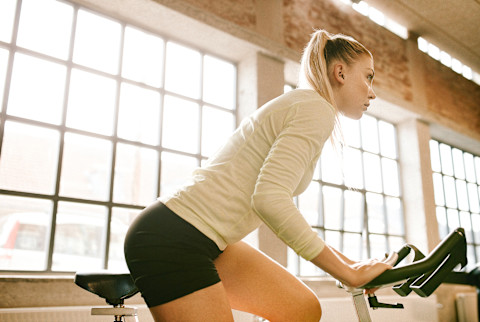Just 15 Minutes Of Intense Exercise Might Improve Your Memory, Study Says

Ever done a particularly tough workout, and instead of feeling tired you actually feel more wired and sharper than before you started?
A group of Swiss researchers set out to further the knowledge of how exercise affects our brains and especially our motor learning skills and memory. In a small study, they found the type of exercise may matter1—especially depending on what part of your memory you want to boost.
Short, high-intensity workouts may be most effective
In order to find out how motor learning memory is affected by sport, the researchers had 15 males, none of whom were considered "athletes," test their memory on three different occasions.
The participants were asked to take the tests after 30 minutes of moderate cycling, after 15 minutes of intensive cycling, and after resting.
The researchers found that the results of the memory test were best after the intensive workout.
In addition to the memory test, they also collected data on participants' endocannabinoid levels. Endocannabinoids are produced by the brain during intense physical exertion and are responsible for some of the positive benefits of exercise, including that feeling of euphoria you get after a great workout.
"These same molecules bind to receptors in the hippocampus, the main brain structure for memory processing," explained Kinga Igloi, a lecturer in the laboratory of professor Sophie Schwartz, who led this research.
They found that the levels of endocannabinoids were also higher in participants after intense physical activity, which suggests this type of activity supports memory function, too.
How different kinds of physical exertion affect different types of memory
Previous research by the same team focused on the impact of exercise on a different type of memory: associative memory.
In contrast to the new study, they found the most effective type of exercise for supporting associative memory is moderate activity. The two studies together show that the impact of exercise on memory varies, depending on the type of memory you want to support.
The researchers say it's important to note that any physical exercise (versus none at all) will improve your overall memory—it just may be possible to strategically choose workouts to help different memory concerns.
How this can help
These findings, both from the study and the previous work by this team, show that careful use of physical activity may be a low-cost, simple way to improve memory.
"Sports activity can be an easy-to-implement, minimally invasive, and inexpensive intervention," says Igloi. For example, she says that having students engage in physical activity after a morning of learning may help solidify the lessons from that day in their memory.
So, if the boost of happy feelings and productivity after a workout isn't enough, it may be worth prioritizing a regular fitness routine to support your brain health and memory as you age.
